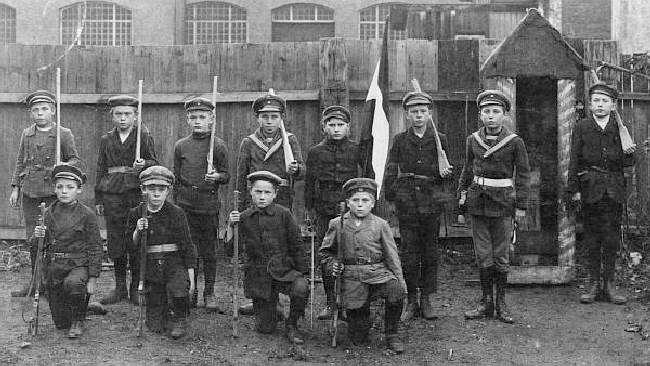
World War I: Germany--Long Gruling War

Figure 1.--Unlike previous wars, the fathers of these German boys in World War I did not come home after a few weeks of sharp campaigning. This photograph was taken in 1915 by hich time it was clear that this would be a very different war for Germany. We have noticed several snapshots like this in the photographic record. Boys in all the beligerant countries played war. But these German children seen a lot more organized in their play than the children in other countries. Image courtesy of the BP Collection.
|
|
Contrary to what both the generals and population on both sides had anticiipated, there was little glory and dashing military victory. Rather there were huge casualties and what seems like intermenable battles. The War turned into a protracted, bruising struggle in which great demands were placed on the each country's population and economies. Here the Kaiser's disasterous foreign policy was largely popular. The Kaiser's bombastic behavior and confrontational diplomacy turned Germany's neigbors into an alliance that was just strong enough to blunt the initial German offensive. The Miracle on the Marne (September 1914) turned the Western Front into a static campaign. The Eastern Front was more fluid, but the size of the Russian Army and the distaces involved meant that it would take several years to achieve victory. And the Italians opened up a bew front in the south. Fighting large armies on three fronts was a struggle in which even the well-trained and equipped German Army was capable of achieving victory. As a result, the Germans for the first time since the Napoleonic Wars found themselves involved in a war lasting more than a few short weeks. And this time Germany's new industry had to contend with a Royal Navy blockade. Germany with its large, professional army had an advatage in a quick, short war. The advantage graually began to shift to the Allies as the conflict turned into a war of attrition. This was not the type of war in which the German ARmy and its Pussian predecesor excelled. The Germans bece experts in defensive warfare on the Western front, but this was not the kind of war that the German Army had been trained to fight. The Allies had larger economic resources, both industrial and agricultural. In addition, the Royal Navy's command of the seas gave the Allies access to the resources of both the Dominions and neutrals like the United States. German had no such access to world markets. The consequences were frigtening for a protracted War. Not only did German industry need raw materials, but Germany was not self sufficent in food. Shortages gradually began to affect uindustrial production as well a living standards at home. The terrible casualties shocked civilians. And unlike previous wars, fthers, sons, husands, and brothers did not return home have a short victorious campaign.
HBC

Navigate the Boys' Historical Clothing Web Site:
[Return to the Main World War I German homefront page]
[Introduction]
[Activities]
[Biographies]
[Chronology]
[Clothing styles]
[Countries]
[Bibliographies]
[Contributions]
[FAQs]
[Glossaries]
[Images]
[Links]
[Registration]
[Tools]
[Boys' Clothing Home]
Navigate the Historic Boys' Clothing Web chronological pages:
[The 1840s]
[The 1900s]
[The 1930s]
[The 1940s]
[The 1950s]
[The 1960s]
[The 1970s]
[The 1980s]
[The 1990s]
Created: 4:29 PM 11/11/2008
Last updated: 4:29 PM 11/11/2008



